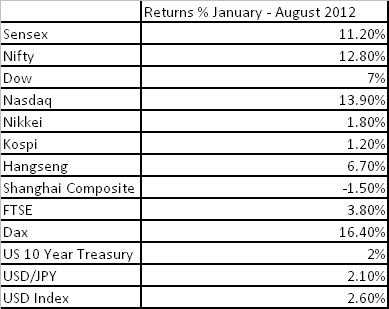The traditional safe have assets of US Dollar, Japanese Yen and US bonds have all seen good strength in 2012. Equities rallying despite weak economic outlook and strong flows into safe haven assets does look like an anomaly as equities are seen as risk assets and usually exhibit negative correlation with safe haven assets.
Table 1 shows the performance of various assets calendar 2012 to date.
[caption id=“attachment_408409” align=“aligncenter” width=“389”]
 Source:Bloomberg[/caption]
Source:Bloomberg[/caption]
Equity indices in India and across the globe have surprisingly stayed on a positive trend in calendar 2012 to date. Surprising because the economic conditions have deteriorated in major economies and there are no signs of improvement in such economies. Eurozone debt crisis has intensified with Spanish ten year bond yields surging to record highs of 7.51% on the back of concerns over its debt. China’s growth has slowed down considerably with second quarter 2012 GDP growth at 7.6%, a three year low. US economic growth has turned sluggish with second quarter GDP 2012 GDP growth at 1.5% against 1.8% growth seen in the first quarter. India is facing growth and inflation issues with RBI revising 2012-13 GDP growth from 7.3% to 6.5% and inflation from 6.5% to 7%.
Countries from Brazil to South Korea are seeing economic outlook deteriorate with Brazil growth falling sharply from 7.5% growth seen in 2010 to expected levels of 1.9% for 2012. Russia’s GDP growth is expected at around 4% for 2012 against a growth rate of 4.2% seen in 2011.
So why are equities staying up and will it continue to trend higher going forward? The answer to the first question is that equity markets are carrying lower risk premium on the back of record low interest rates in the US and Eurozone. The answer to the second question is yes, equities will trend higher going forward as the US economy benefits from interest rates.
Let us see why equities are staying up and why they will move up going forward.
Equities are staying up on prospects of easy liquidity and low interest rates
The weak economic data is spurring central banks to maintain an accommodative monetary policy. The US Federal Reserve (Fed), the ECB (European Central Bank) and the PBOC (People’s Bank of China) are amongst the major central banks that have loosened and are loosening monetary policy. Interest rates in the US are close to zero% while rates in Eurozone is at 0.75%. PBOC has cut rates twice, once in June 2012 and once in July 2012 besides easing bank reserve ratios. ECB has indicated that it will commence buying bonds of Italy and Spain leading to more liquidity let into the system. The ECB had earlier infused Euro one trillion into the system thorough LTRO (Long Term Refinancing Operations).
Central banks from Brazil to South Korea have cut rates to prevent economic growth from coming off sharply on the back of weak global economies. RBI has cut the CRR (Cash Reserve Ratio) by 125bps and lowered the repo rate by 50bps in 2012.
The low rates and liquidity infused by central banks are finding their way into equities apart from going into safe haven assets. The cheap money is going into equities as low interest rates lower risk premium on stocks. Hence equities have stayed up despite incremental data coming in weak.
Will equities trend higher going forward?
Cheap central bank money alone is not enough for equity markets to perform. Equity performance depends on the performance of the corporate sector and if that does not come about, equities will go back to where they came from. US corporates are doing well in the current scenario with corporate profit after tax at record highs on an absolute as well as a percentage to GDP levels as of first quarter of 2012. US private payrolls rose 172,000 in July 2012 against estimates of gain of 110,000. US companies are hiring, albeit at a slow pace but hiring nevertheless. US economy have been adding jobs month on month over the last year and half indicating job market recovery.
US equities are looking more positive than negative given positive incremental data on profits and jobs. Rising US equity markets do tend to rub off on global equity markets including Indian equities given that the US is the world’s largest economy.
Arjun Parthasarathy has spent 20 years in the financial markets, having worked with Indian and multinational organisations. His last job was as head of fixed income at a mutual fund. An MBA from the University of Hull, he has managed portfolios independently and is currently the editor of www.investorsareidiots.com </a>. The website is for investors who want to invest in the right financial products at the right time.
)